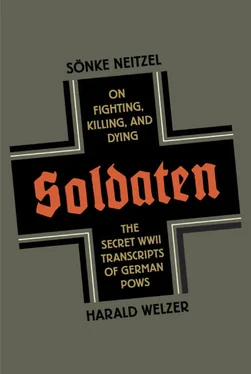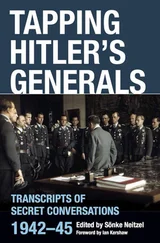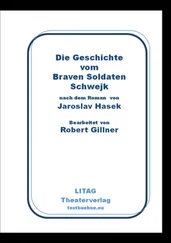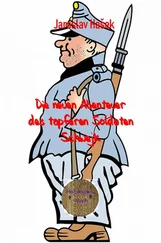Descriptions of killings like those related by Lieutenant Pohl occur frequently in the protocols with similar frankness and a likewise matter-of-fact tone, although most of them are less detailed. Apparently, soldiers did not fear that their interlocutors would react with confusion, condemnation, or protest when they told of gunning down others. We can likely put that down to the fact that the speakers under surveillance were all men with similar horizons of experience communicating in the same frame of reference. They were all members of the German military and had all waged the same war for the same reason. They didn’t need to explain to one another the whys and wherefores of things that readers of the protocols seventy years later might find puzzling. In fact, the character of their conversations is much like the sorts of chats people have at parties or occasions when people with similar experiences happen to come together. They swap stories, asking questions and interjecting remarks of their own. They exaggerate and are keen to show that they all belong to the same group, the same experiential community.
The topics of conversation among soldiers may be different, but the structure of their conversations isn’t. Luftwaffe members tend to tell hunting tales, not surprisingly, since many of them were fighter or bomber pilots tasked with destroying specific targets like enemy planes or ground installations. As of 1942, they were also charged with spreading general terror among civilian populations. The tales the men tell are adventure stories that focus on their own flying skill and ability to produce destructive results. Here is one typical example:
FISCHER: Quite recently I shot down a Boston, I put the rear-gunner out of action first, he had three machine-guns, you could see him firing quite plainly, from the tracers from his machine-guns. I was in a “190” with two machine-guns. I pressed the button for a very short burst. He crumpled up—that’s all, not another shot, the barrels were sticking right up. Then I put a short burst into the starboard engine, which caught fire; I then turned my cannons on to the port engine. The pilot very probably got hit at that moment—I kept my thumb on the button the whole time—it went down in flames. There were twenty-five Spitfires after me; they had followed me inland as far as ARRAS.
KOCHON: Where did you land?
FISCHER: On my own aerodrome. They had to turn back, as they couldn’t fly so far for lack of fuel. I then returned to ST. OMER. I shot down Bristol Blenheim in a similar manner. I first fired at the side of the tail unit, and the rear-gunner kept firing past us on either side. I swerved to the right and started to fire, and he fired at me like a madman. I swerved right over to the left, and as I was doing so I pressed the button and his cupola flew off, for in pressing the machine-gun button I pressed that of the cannon too. It was knocked to bits, and he was lying dead inside. I kept firing into the tail unit and the tail broke off, with bits of the fin, and the aircraft crashed. {97} 97 SRA 2642, 15 June 1942, TNA, WO 208/4126.
Motorcyclists and extreme-sports enthusiasts tell structurally similar tales. In the soldiers’ stories, those killed are mentioned simply by way of providing colorful detail. Victims never have personal attributes. Their role in the anecdotes of German airmen is much the same as that of enemies in video games, particularly of the ego-shooter variety, a half century later. This comparison is hardly anachronistic. In both air combat and video games, the process itself is more important than a clearly defined result. The airman/game player’s activity revolves around skill and reflexes, and the results are measured in “counts,” the number of various types of targets destroyed. A significant component of the reference frame here is competitive sports, coupled with a typical male fascination with technology. The victim is insignificant either as an individual or part of a collective.
The complete absence of distinguishing details concerning targets makes it apparent that the storytellers aren’t concerned with whom they hit. The main thing is that they hit their targets, and that the stories they can tell about it afterward are entertaining:
BIEBER*: What kind of targets do you attack in the daytime?
KÜSTER*: It all depends. There are two sorts of war-flight. First of all there are those pirate raids in which factories engaged in war industries and so on are attacked.
BIEBER: But always by single aircraft?
KÜSTER: Yes. And then there are these nuisance raids when it doesn’t matter a damn whether you smash up a fishing village or a small town or something else of the sort. You are given some target or other: “You will attack such-and-such a town.” And if you don’t get it, you just drop your bombs somewhere else.
BIEBER: Do you feel that these pirate raids and nuisance raids are worth while?
KÜSTER: The pirate raids are. We made ours on NORWICH; it was great fun.
BIEBER: Do you mean you simply smashed up a town?
KÜSTER: Yes. Actually we were to have attacked a certain factory, but…
BIEBER: Are you told exactly which factories—?
KÜSTER: Yes.
BIEBER: What is there at NORWICH?
KÜSTER: There is an aircraft component parts factory there.
BIEBER: Oh, that was what you were supposed to attack?
KÜSTER: Yes. We had flown over and all at once it began to rain; you could only see about 200 metres. Suddenly we were over the main railway station at NORWICH; it was too late; we should have turned off to the left somewhat sooner. As it was we should have had to bank steeply at an angle of 30º to 95º. There was no point in it, they would have known what we were after. So we flew straight on; the first thing I saw was a funny sort of factory building and I released my bombs. The first bomb fell in that building and the others in the factory. That was in the morning at about 3 o’clock to 8-30.
BIEBER: Why didn’t you drop your bombs on the station?
KÜSTER: We saw the station too late. We flew in from the east and the station is right at the approach to the town. We didn’t fire on the people at the station; there wouldn’t have been any point in it until we had got rid of our bombs. But afterwards we shot up the town; we fired at everything that was there, at cows and horses, it didn’t matter what. We fired at the trams and everything; it’s great fun. There was no A.A. there.
BIEBER: What happens, are you told about a target like that the day before?
KÜSTER: The actual target is not announced beforehand at all. Everyone plans in advance what he is going to attack; whatever appeals to him. It’s left to the crew. And then when the weather is favourable in a given district, each crew is asked: “Have you any particular target?” {98} 98 SRA 3536, 9 January 1943, TNA, WO 208/4129.
The listener in this excerpt from the protocols, Bieber, was a German stool pigeon working for British intelligence. That is why he poses questions, ostensibly out of specialist interest, about the details of German air raids. The storyteller, Lance Corporal Küster, was a gunner on a German bomber. The anecdote is from January 1943.
The anecdote does not touch on a lot of details that might be of interest to civilians. Instead the questions that drive the dialogue between the two airmen are: why wasn’t the train station attacked, and when was the target set? The conversation produces entertaining insider-oriented stories structured around three aspects: an action, its execution, and the fun that was had. Questions like why was the mission flown and was it legally and morally justifiable play no role whatsoever. Nor do airmen discuss the dramatically changing strategic and operational framework of air combat.
Читать дальше












